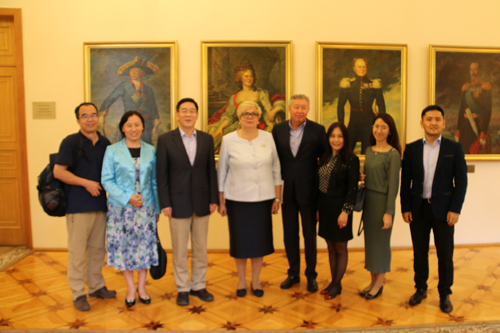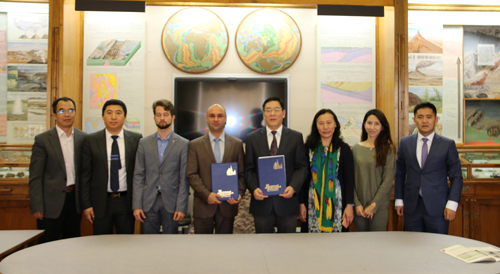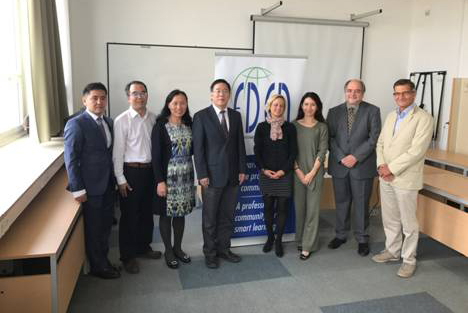 A five-person delegation headed by Li Ling, vice president of the Open University of China (OUC), visited Herzen State Pedagogical University of Russia (Herzen University), Lomonosov Moscow State University, and European Distance and E-Learning Network to explore the potential for cooperation, resulting in a signed cooperative agreement with Lomonosov Moscow State University.
A five-person delegation headed by Li Ling, vice president of the Open University of China (OUC), visited Herzen State Pedagogical University of Russia (Herzen University), Lomonosov Moscow State University, and European Distance and E-Learning Network to explore the potential for cooperation, resulting in a signed cooperative agreement with Lomonosov Moscow State University.

The OUC delegation’s first stop was at Herzen University on 13th September, 2017. The delegation visited the university’s campus and library, which has 200 year history, and met with Veronica Liang, director of the Chinese Cultural Centre, as well as other Herzen University personnel. The two parties introduced their respective universities. Herzen University showed great interest in the OUC and its characteristics, and expressed great potential in a cooperation between the two universities, especially in the areas of Chinese education, pre-school education, teacher education, and exchange studies. Professor Veronica Liang expressed her willingness to continue exchanges with the OUC in the near future.

On 15th September, the delegation arrived at Lomonosov Moscow State University and signed a Strategic Cooperative Agreement Between Lomonosov Moscow State University and the Open University of China with vice president Mazei Yuri. According to the agreement, the two universities decided to jointly develop a series of public Russian language courses, which will integrate both online and offline studies, and introduce a certificate system for “Russian Language Examinations for Foreign Students”’ in the curriculum design. After completing the courses, the students will receive Russian language certificates recognised by both Russia and China. The two parties will also cooperate on digital learning resources and a non-degree training programme. The universities agreed that the cooperation should be implemented in a serious, yet down-to-earth manner to fulfill the objectives specified in the agreement, and lay a sound foundation for long-term cooperation.
The visit is another important step forward in promoting Sino-Russian cultural and educational exchanges between the two universities, following the OUC’s participation in the China-Russia High Level Education Forum sponsored by the Chinese Ministry of Education in 2015, and Mazei Yuri’s visit to the OUC in February 2016.

On 18th September, the delegation visited the secretariat of European Distance and E-Learning Network (EDEN), and met with Dr. Andras Szucs, secretary general of EDEN. Li Ling elaborated on the OUC’s, its history and development, and achievements made during its transformation and construction. Guo Qingchun, director of the OUC Experimental School, Liu Zhanrong, director of the Faculty of Foreign Languages, and Rehati, deputy director of the OUC Learning Resources Department (Library), gave reports on the OUC’s online and mobile learning, as well as its learning resources bank. EDEN personnel introduced its background, mission, and responsibility, as well as related programmes organised in recent years. Li Ling hoped academic exchange programmes would be made between the OUC and EDEN, and that OUC faculty will join EDEN’s in joint academic activities. Dr. Andras Szucs gave high praise to the OUC’s development and its contributions to the Chinese community, and welcomed the OUC to participate in EDEN’s academic programmes and activities in the areas of distance and online education.
Founded in 1797, and located in downtown St. Petersburg, Herzen State Pedagogical University of Russia is also known as Herzen University. It ranks first among teacher’s education universities in Russian-speaking countries.
Lomonosov Moscow State University, the largest university and academic centre in Russia, is globally renowned among higher education institutions, has a history of more than 250 years, and is a self-governing body operating under its own Charter and the laws of the Russian Federation.
Founded in 1991, the European Distance and E-Learning Network (EDEN) is the most influential non-profit organisation in distance and e-learning education in Europe. The organisation exists to share knowledge and improve understanding among professionals in distance and e-learning, and promote policy and practice across Europe and beyond. The membership organisation is comprised of 200 institutions and 1,200 individuals across all education and training levels. EDEN facilitated collaboration between a wide range of organisations, networks, and experts. EDEN organises annual European conferences, Bi-annual Research Workshops, and Open Classroom Conferences. Since 1995, EDEN has run the European Journal of Open, Distance, and E-Learning (EURODL), a platform for academic, experiential exchanges, and collaboration between global professionals in the industry.
By Dai Jing, OUC